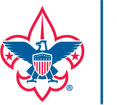Rank Advancement
Rank Advancement is Scout Led
- Troop 506 scouts must initiate and complete all steps of the advancement process. This means contacting adult leaders for sign-offs, boards of review and to submitting their service hours and/or merit badge applications. Scouts must also to take responsibility for contacting merit badge counselors and completing their work.
- Parents play an important role in encouraging and reminding through the process. However, parents must not take on the scout’s responsibilities. To do so eliminates opportunity to develop responsibility and self confidence.
Rank Advancement Requires Independent Evaluation
- Parents must not serve as a Merit Badge Counselor or on a Board of Review or sign-off rank advancement requirements for their own scout.
- With some exceptions that must be pre-approved by the Parent Committee Chair and Scoutmaster, scouts are discouraged from using Merit Badge Counselors who are troop parents.
- The above policies avoid any perceptions about inconsistency in measurement process and develop confidence in the boys through interaction with other adult leaders.
Scouts Can Expect Consistency and Fairness
- These standards are applied consistently to all boys, regardless of their rank or level of family involvement in the troop.
- Leaders must consider the tenets of the Boy Scout Law and strive towards high ethical standards in administering the program.
Steps for Advancement
- The scout learns the skills required for the rank and demonstrates these to a designated senior scout or adult leader, who then signs that the skill has been learned in the Scout’s Handbook.
- For ranks up to and including First Class, skills do not need to be demonstrated/signed-off in order. For example, a scout at a younger rank such as Tenderfoot, could obtain approvals for First Class requirements.
- After the scout has accomplished all of a rank’s requirements, the scout schedules a Scoutmaster Conference (SMC) using the online SMC calendar.
- After the SMC, the scout requests a Board of Review (BOR) by contacting the BOR Chair for scheduling. The scout should not delay in this step, since BOR calendars fill quickly, especially in advance of a Court of Honor (COH).
- The scout meets with the BOR, and if necessary, returns at a later date to answer additional questions. It is an important point that such continuations of the BOR not be perceived by the scout or their parents as a failure. Rather, they are opportunities for the scout to build confidence by better communicating what they are able to do. This is of particular importance given the nature of Troop 506 Activities, many of which are high adventure.
- The rank is conferred on the date of successful completion of the BOR. However, the rank is not physically awarded to the scout until the following COH.
The trail to Eagle is not a race, and parents should resist the urge to “rush” their scout through the program. There is no fixed “timeline” for advancement to any particular rank. Let the scout set the pace for advancement with encouragement by parents and the Scoutmaster. Peer pressure will eventually motivate most scouts to progress so as not to fall behind friends and peers.
While it is technically possible to advance from Scout to First Class in one year, and for a scout to meet the requirements of Eagle as early as 14-15 years of age, it has been our experience that the scouting program is more meaningful if rank advancement proceeds at a more deliberate pace and that the achievement of Eagle rank will confer greater personal benefit if the scout is 16 or 17. While this is not required, older scouts are more capable of planning and executing an ambitious project, and receive much greater benefits from the experience due to their growing maturity. Also, while the product of the Eagle Project is beneficial to the receiving organization, the real purpose of the Eagle Project is for the organizational and management experiences that the scout gains.
Each rank has a component that is particularly challenging, such as the 30-day fitness program for Tenderfoot or planning and cooking a patrol meal for First class. These requirements are challenging for a reason – the scouts learn and grow by meeting the challenge. For that reason, the requirements of these tasks and advancement in general should not be altered or relaxed, nor should parents or other adults perform the task for the scout.
The SMC and BOR processes for each rank advancement should be initiated by the scout, not the parent. The SMC always precedes the BOR. Only the BOR coordinator can schedule a BOR. Scouts and parents should honor the deadlines for SMCs and BORs. It should be noted that SMCs and BORs can take place throughout the year. It is not necessary to wait for the next COH for a Scout to achieve rank advancement. The Scout is granted the new rank as of the date of the successful BOR. Formal recognition of the advancement will take place at the next scheduled COH, but the date of the BOR is the critical date for advancement purposes.
The Scoutmaster, Boards of Review Coordinator, and Advancement Coordinator are responsible for maintaining the rigor and integrity of the troop’s advancement program. Earning a merit badge and achieving a rank advancement from Troop 506 signifies that the scout has met all the requirements and satisfied all the prerequisites. Shortcuts will not be allowed.
Finally, in order to avoid any conflict of interest, rank advancement sign-offs and verification merit badge completions must be done by an adult leader other than the scout’s parent(s). Similar concerns motivate the troop’s historical preference for merit badge counselors outside of the troop.


